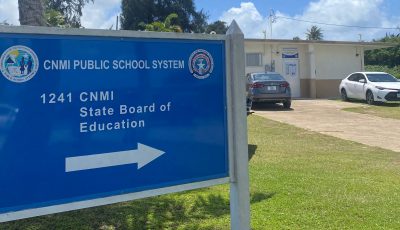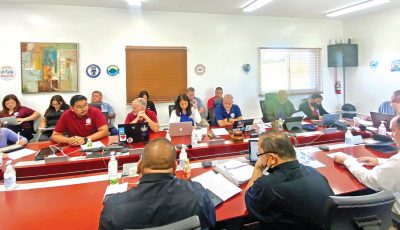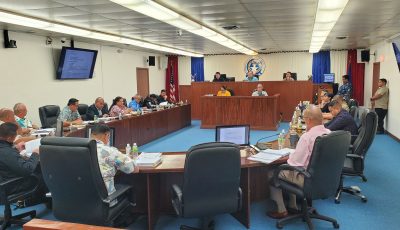TO AVERT ‘PAYLESS FRIDAYS’
BOE cuts salary raises
The Board of Education voted yesterday to slash the salary increases of Public School System staff by 50 percent, with the exception of employees earning below $23,660 per annum, during a marathon board meeting on Capital Hill.
The new expense schedule—one of five proposed—was touted as the best way to avert “payless Fridays” even as the BOE declared a fiscal emergency during the seven-hour board meeting.
BOE members Andrew Orsini, Philip Mendiola-Long, and board chair Janice A. Tenorio voted for the implementation of the salary reduction, while Rota representative Herman Atalig voted yes via teleconference after Saipan representative Marylou Ada walked out of the session at around 4pm yesterday. Atalig initially left the BOE meeting at around 2pm to catch a flight to Rota but returned shortly after Ada stormed off.
The new step means that salary checks will cover only the paychecks of employees minus all the trimmings—Group Health and Life insurance; medical insurance; utilities; etc.
The other option that BOE members were looking at included reduced gross income regardless of an employee’s per annum salary, while the most extreme measure was a rollback of all salary increases implemented in 2017, which BOE members discarded due to the possibility of rebellion.
In an earlier BOE fiscal, personnel, and administrative committee meeting last Tuesday afternoon, Gov. Ralph DLG Torres, along with Finance Secretary David Atalig, informed FPA members that at the very best, the central government may only remit about $700,000 to PSS bi-weekly, a large cut in their annual budget of $36 million for fiscal year 2019. The members noted that $700,000 is not enough for PSS.
With at least $1.1 million bi-weekly and only $700,000 of possibly erratic bi-weekly central government remittances, the BOE had to come up with an additional $400,000 in order to cover the bare minimum of paychecks. The drastic salary cut, which would be implemented immediately, is enough to cover the bi-weekly shortfall.
Tenorio: If we acted sooner, this wouldn’t have hurt
Tenorio noted in a statement that had PSS acted as soon as Torres informed government agencies that budget cuts would be implemented, the financial impact to PSS wouldn’t have been as dire.
“There is no new revenue to sustain the operation of government services—all government services, including critical and constitutionally mandated services such as education, healthcare, public safety,” Tenorio said in a written statement she read to the BOE. “…If we actually took a deeper understanding of this scenario last January by implementing mitigating cuts and cost-cutting [measures], what we are going to decide [today] will not be as difficult as it may seem.”
Last May 7, PSS finance director Chris Ching proposed to then-acting Education commissioner Lynnette Villagomez cost-cutting measures that ultimately would have resulted in a 10-percent work-hours reduction\for year-round PSS employees: PSS management, janitors, maintenance, bus drivers, and more.
However, Orsini and Atalig voted against this measure, while Tenorio and Ada voted for it. Ching also informed the BOE during their last board meeting that further delays in the implementation of this cost-cutting measure would result in a more extreme cut in the future.
Ada walks out
The BOE was left with only three members at one point during yesterday’s seven-hour board meeting when Ada stormed out after a stalemate to implement one of the more drastic salary-cutting measures.
With Tenorio and Long voting for the implementation of the salary increase rollback and Ada and Orsini joining forces against it, the BOE was left with a stalemate as Atalig was not present at the time.
An hour-long into discussions on implementing a rollback descended into a motion introduced by BOE member Long.
During discussions, the BOE took into consideration that there could possibly be a rebellion among teachers should the rollback be implemented. On the other hand, PSS would be able to keep schools open along with paying for utilities expenses.
Resulting in a stalemate, Ada attempted to move to adjourn the meeting, but Tenorio did not entertain it.
“We don’t have cash. We need a decision now or else there is no payroll,” Long said right after the stalemate.
Tenorio addressed the two members who voted against the measure, “We have no cash for payroll,” she said. “We haven’t even received the payroll this Friday.”
“I think you should respect the respective member’s [decision]… I voted no, and I am entitled to that. I would like to just adjourn,” Ada replied, bidding the PSS representatives good luck with the payroll. “There is always a solution,” she added.
“What is your solution? May we get into that?” asked Tenorio.
“I already voted no. Motion is status quo. I move to adjourn the meeting; we cannot go around and start asking everybody why they do what they did,” Ada rebutted.
The back and forth went on with Ada even calling Tenorio out of order for questioning her and pressing her for answers.
“I made a motion to adjourn and, if not [entertained] I would just walk out and there would be no quorum,” Ada said. “I don’t want to explain myself,” adding that she slept late the previous night and even went to church for guidance.
Ada then stepped out while Long suggested the 50-percent reduction in salary increases—the measure that ultimately gained enough support.
Ada did not step back into the meeting.
Torres to submit revenue-generating proposal
In a statement last night, Torres noted that he would be submitting a revenue-generating proposal to the CNMI Legislature to make money for PSS, the Northern Marianas College, and the Commonwealth Health Care Corp.
“I will be submitting a revenue-generating proposal to the Legislature that outlines a liquid fuel tax increase of 2 cents with the generated revenue allocated specifically for PSS, Northern Marianas College, and Commonwealth Health Care Corp. for a period of two years,” Torres stated, adding that education and healthcare are the top priorities to fund during these times.
“…Protecting teacher salaries, maintaining academic programs, and funding our islands’ only hospital are shared goals that need to be addressed first and foremost.”
“This drastic reduction in the PSS fiscal year 2019 budget forced the BOE to prioritize teacher and employee paychecks over nothing at all. However, employee paychecks bi-weekly at the bare minimum amounted to $2.2 million monthly, and that was already without the additional costs such as taxes and insurances,” he added.
Ching noted yesterday that, according to the recent BOE FPA committee meeting with Torres, PSS is expected to absorb a $7.5-million reduction for the remainder of their fiscal year 2019 budget instead of the previously-estimated $7.1 million.
“We appreciate members of the [BOE] for understanding the budget shortfall that we are all currently facing as a government. In preparation for this, I’ve had several discussions over the last few months with members of the board and the Legislature in order to fully protect our teachers’ salaries so that classes do not get disrupted for our students and their families,” he said.



























